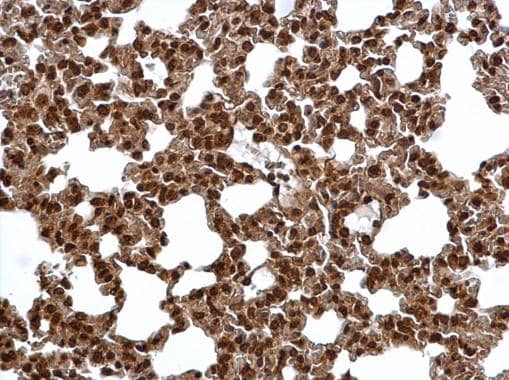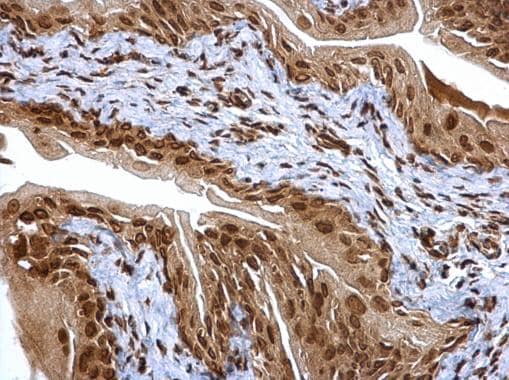Anti-Proteasome subunit alpha type 6 antibody (ab97563)
Key features and details
- Rabbit polyclonal to Proteasome subunit alpha type 6
- Suitable for: WB, IHC-P, ICC/IF
- Reacts with: Mouse, Rat, Human
- Isotype: IgG
Overview
-
Product name
Anti-Proteasome subunit alpha type 6 antibody
See all Proteasome subunit alpha type 6 primary antibodies -
Description
Rabbit polyclonal to Proteasome subunit alpha type 6 -
Host species
Rabbit -
Tested applications
Suitable for: WB, IHC-P, ICC/IFmore details -
Species reactivity
Reacts with: Mouse, Rat, Human
Predicted to work with: Pig, Zebrafish
-
Immunogen
Recombinant fragment corresponding to Human Proteasome subunit alpha type 6 aa 57-244.
Database link: P60900 -
Positive control
- WB: 293T, A431, H1299, HeLa, HepG2 and MOLT4 cell lysates IF: A431 cells IHC-P: H1299 xenograft
-
General notes
Reproducibility is key to advancing scientific discovery and accelerating scientists’ next breakthrough.
Abcam is leading the way with our range of recombinant antibodies, knockout-validated antibodies and knockout cell lines, all of which support improved reproducibility.
We are also planning to innovate the way in which we present recommended applications and species on our product datasheets, so that only applications & species that have been tested in our own labs, our suppliers or by selected trusted collaborators are covered by our Abpromise™ guarantee.
In preparation for this, we have started to update the applications & species that this product is Abpromise guaranteed for.
We are also updating the applications & species that this product has been “predicted to work with,” however this information is not covered by our Abpromise guarantee.
Applications & species from publications and Abreviews that have not been tested in our own labs or in those of our suppliers are not covered by the Abpromise guarantee.
Please check that this product meets your needs before purchasing. If you have any questions, special requirements or concerns, please send us an inquiry and/or contact our Support team ahead of purchase. Recommended alternatives for this product can be found below, as well as customer reviews and Q&As.
Properties
-
Form
Liquid -
Storage instructions
Shipped at 4°C. Upon delivery aliquot and store at -20°C or -80°C. Avoid repeated freeze / thaw cycles. -
Storage buffer
pH: 7.00
Preservative: 0.01% Thimerosal (merthiolate)
Constituents: 1.21% Tris, 0.75% Glycine, 20% Glycerol (glycerin, glycerine) -
 Concentration information loading...
Concentration information loading... -
Purity
Immunogen affinity purified -
Clonality
Polyclonal -
Isotype
IgG -
Research areas
Images
-
Anti-Proteasome subunit alpha type 6 antibody (ab97563) at 1/1000 dilution + mouse liver lysate at 50 µg
Predicted band size: 27 kDa
-
 Immunohistochemistry (Formalin/PFA-fixed paraffin-embedded sections) - Anti-Proteasome subunit alpha type 6 antibody (ab97563)
Immunohistochemistry (Formalin/PFA-fixed paraffin-embedded sections) - Anti-Proteasome subunit alpha type 6 antibody (ab97563)Immunohistochemical analysis of paraffin-embedded mouse lung tissue staining Proteasome subunit alpha type 6 with ab97563 at 1/500 dilution.
Antigen Retrieval: Trilogy™ (EDTA based, pH 8.0) buffer, 15min.
-
ab97563, at a 1/200 dilution, staining Proteasome subunit alpha type 6 in paraformaldehyde-fixed A431 cells by Immunofluorescence analysis. Right image is merged with a DNA probe.
-
All lanes : Anti-Proteasome subunit alpha type 6 antibody (ab97563) at 1/1000 dilution
Lane 1 : 293T whole cell lysate
Lane 2 : A431 whole cell lysate
Lane 3 : H1299 whole cell lysate
Lane 4 : HeLa whole cell lysate
Lysates/proteins at 30 µg per lane.
Predicted band size: 27 kDa
12% SDS PAGE -
Anti-Proteasome subunit alpha type 6 antibody (ab97563) at 1/1000 dilution + rat liver lysate at 50 µg
Predicted band size: 27 kDa
-
 Immunohistochemistry (Formalin/PFA-fixed paraffin-embedded sections) - Anti-Proteasome subunit alpha type 6 antibody (ab97563)
Immunohistochemistry (Formalin/PFA-fixed paraffin-embedded sections) - Anti-Proteasome subunit alpha type 6 antibody (ab97563)Immunohistochemical analysis of paraffin-embedded mouse urinary bladder tissue staining Proteasome subunit alpha type 6 with ab97563 at 1/500 dilution.
Antigen Retrieval: Trilogy™ (EDTA based, pH 8.0) buffer, 15min.
-
 Immunohistochemistry (Formalin/PFA-fixed paraffin-embedded sections) - Anti-Proteasome subunit alpha type 6 antibody (ab97563)
Immunohistochemistry (Formalin/PFA-fixed paraffin-embedded sections) - Anti-Proteasome subunit alpha type 6 antibody (ab97563)Immunohistochemical analysis of paraffin-embedded mouse liver tissue staining Proteasome subunit alpha type 6 with ab97563 at 1/500 dilution.
Antigen Retrieval: Trilogy™ (EDTA based, pH 8.0) buffer, 15min.
-
 Immunohistochemistry (Formalin/PFA-fixed paraffin-embedded sections) - Anti-Proteasome subunit alpha type 6 antibody (ab97563)ab97563, at a 1/100 dilution, staining Proteasome subunit alpha type 6 in paraffin-embedded H1299 xenograft by Immunohistochemical analysis.
Immunohistochemistry (Formalin/PFA-fixed paraffin-embedded sections) - Anti-Proteasome subunit alpha type 6 antibody (ab97563)ab97563, at a 1/100 dilution, staining Proteasome subunit alpha type 6 in paraffin-embedded H1299 xenograft by Immunohistochemical analysis.




















